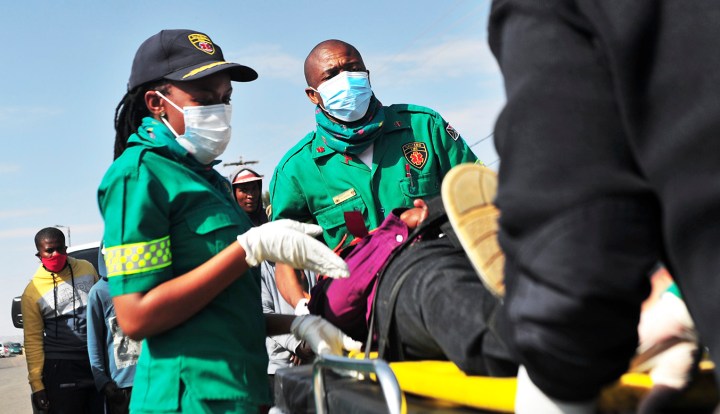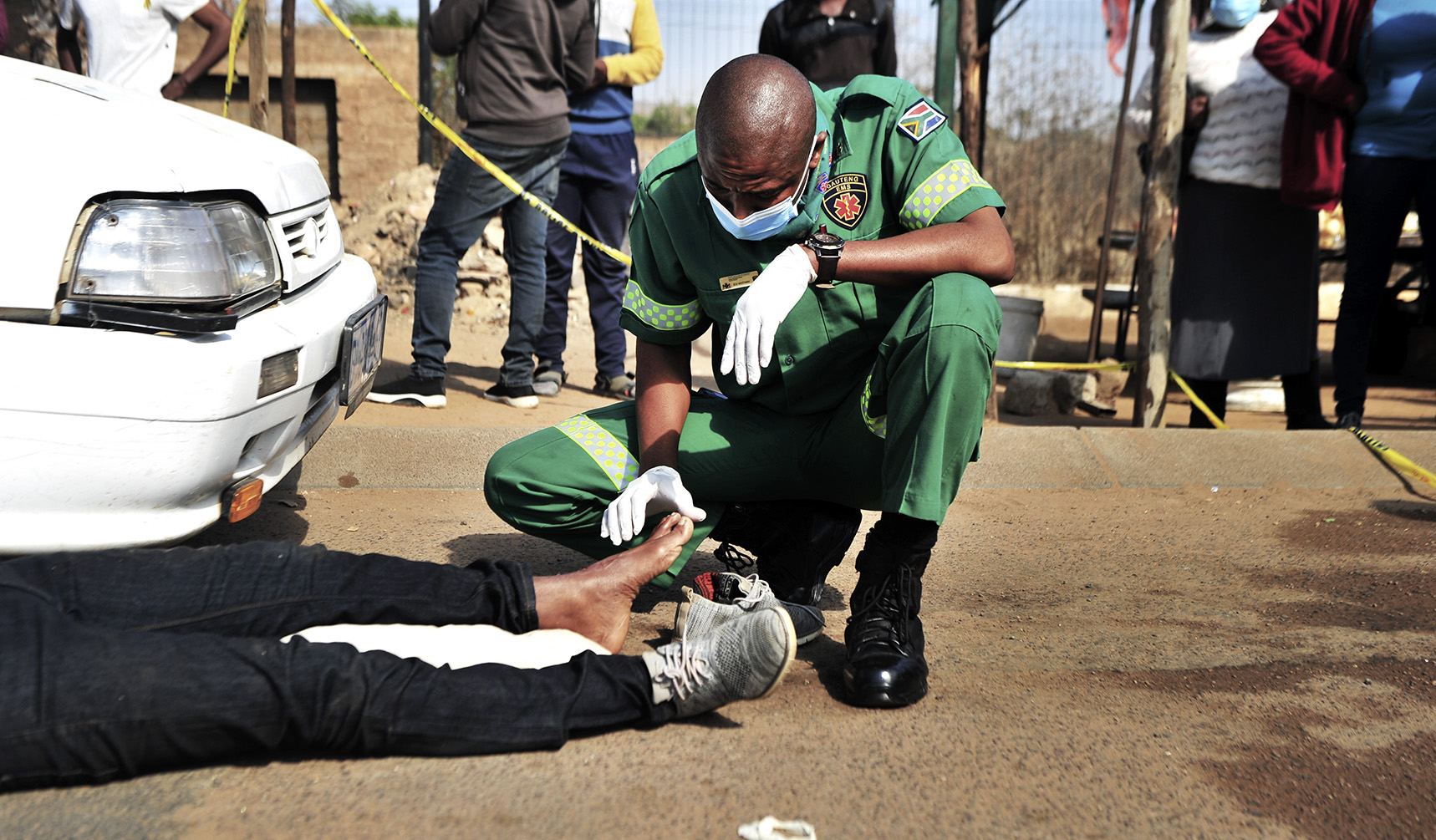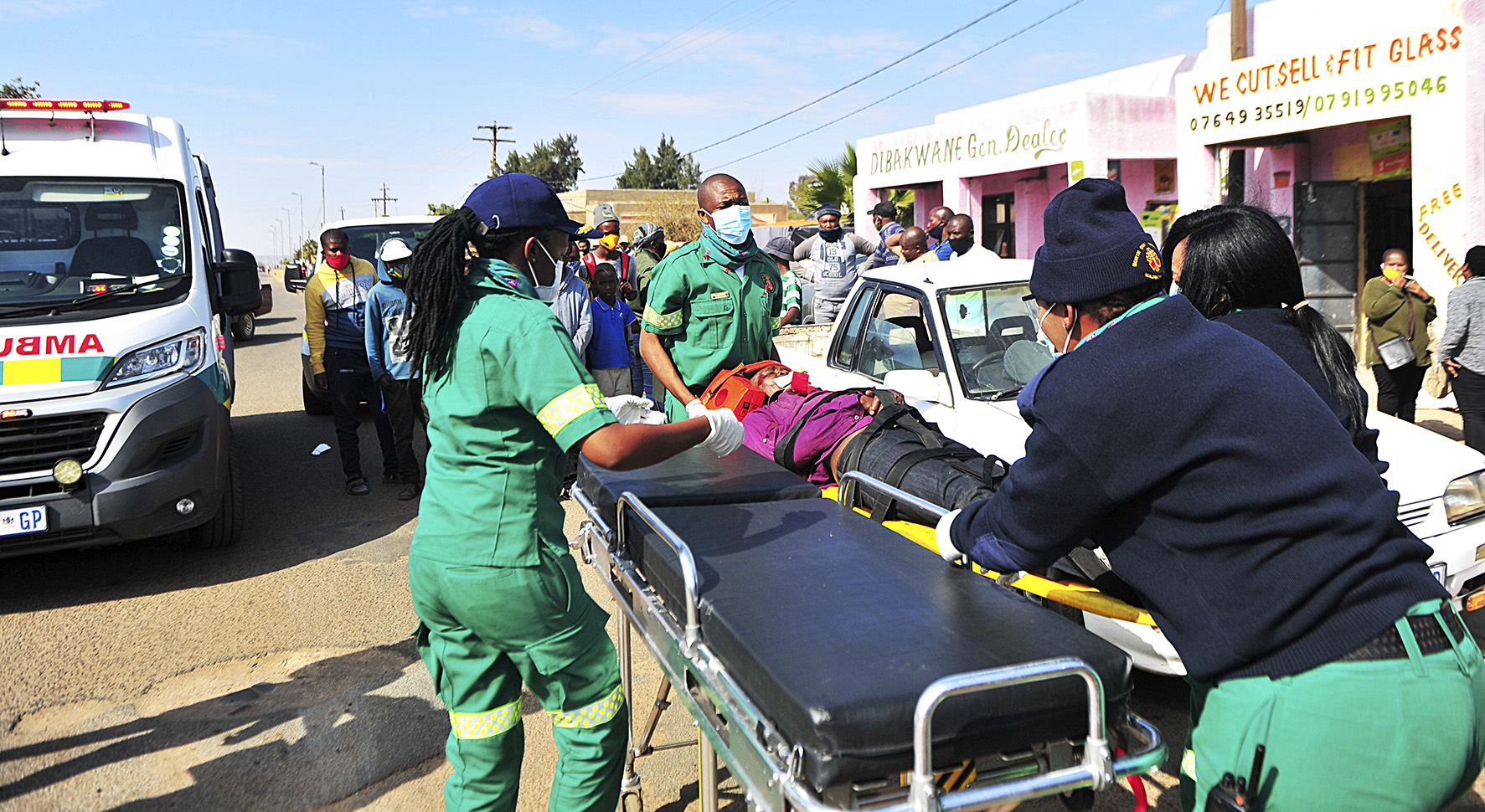SPOTLIGHT
On the streets with paramedics amid Covid-19 and high crime rates

In South Africa, responding to medical emergencies can mean risking your life, possible assault and losing some of your belongings. The Covid-19 pandemic has exacerbated and added to these daily challenges faced by paramedics.
It’s 6:38am at Prinshof Ambulance station in Pretoria on 10 July. On the grounds, two ambulances are parked, washed and sanitised for the day’s call-outs. Later, after this shift, the vehicles will be sanitised again.

Emergency medical services vehicles are sanitised before and after every shift. (Photo: Denvor de Wee / Spotlight)
The same morning an emergency call comes through to attend to an accident scene. Spotlight’s photographer hops into the EMS car with two paramedics – Ernest Motswai and Jane Kekana. They say they use the Emergency Medical Services (EMS) car because they can get to an accident scene quicker, especially for smaller response calls.

Before the shift starts: The morning briefing at Prinshof ambulance station in Pretoria. (Photo: Denvor de Wee / Spotlight)
At the scene, Motswai and Kekana help stabilise a pedestrian involved in a motor vehicle accident. The patient was knocked over by a passing trailer. He is bleeding from his mouth and lost some teeth.
Later during an interview with the two paramedics after the incident, a loud voice rumbles and crackles through the emergency radio. It is clear from the interview that call-outs to scenes are often not as “uneventful” as this.

Paramedics attend to an accident scene in Johannesburg. (Photo: Denvor de Wee/Spotlight)
EMS and robbers
Kekana says although the lockdown began quietly because people were not on the road much, things changed drastically on Level 3. She says motor vehicle accidents, assaults and gunshot incidents multiplied.
Another challenge, says Kekana, is that there are prank calls.

On the scene: Paramedics attend to a pedestrian knocked over by a passing vehicle. (Photo: Denvor de Wee / Spotlight)
We would go out thinking it’s an emergency call… When we get there, there is no caller nor patient.”
She says sometimes when they go into a house (often during a prank call incident), they would return to their vehicle and it would have been broken into.
“When you return to the vehicle, your belongings have been taken, like your cellphone, wallets, money or rings.”

The South African Emergency Personnel Union raised concerns over the lack of personal protective equipment at some ambulance stations. (Photo: Denvor de Wee / Spotlight)
The department has now installed a panic button and a tracking system in EMS vehicles.
“The manager can call the paramedic to hear if everything is okay, but the worry is that sometimes in certain areas, especially rural areas, the radio won’t have a signal.”
They often have to educate communities on what it is they do as EMS, says Kekana, and rely on communities to help keep them safe.

Some paramedics say wearing full personal protective equipment slows them down. (Photo: Denvor de Wee / Spotlight)
“Some people don’t understand what EMS is about. They think it’s like SAPS – that we have guns on us.”
She says although they had done awareness projects in communities before the lockdown, it is now difficult to do this.
Gauteng Health spokesperson, Kwara Kekana, says between January and March 2020, there were six attacks on EMS officials. Between April and June, there were four and in July there was one.
“In part, there has been a reduction during Level 5 of lockdown, but since then the situation is the same, given the number of attacks.”

Getting ready: Jane Kekana, paramedic, prepares the emergency medical services vehicle for her shift. (Photo: Denvor de Wee / Spotlight)
She says the attacks on EMS personnel impacts on the mental state and overall well-being of their employees by making them anxious on duty. It can lead to post-traumatic stress disorder (PTSD).
“It also impacts on response times to emergencies due to delays in getting SAPS to escort emergency vehicles.”
Kekana notes there are financial losses with every robbery, especially losses of personal items by staff. To mitigate these risks, the Gauteng Department of Health made a series of interventions. These include discussions with local police and community policing forums and circulating guidelines to EMS staff on what to look for and to assess each emergency call for possible attacks. She says the department continuously communicates with communities and citizens on various platforms.
Covid-19 fears
Motswai says, as with many frontline workers, paramedics also have fears about Covid-19.
“It’s very scary. Covid-19 is everywhere – it’s difficult to tell if you contracted it from home or from work. You just have to stay positive that you will be fine.”
A big part of their job now is to inform people about wearing masks. Matswai says they now have to make sure people wear a mask before they get into an ambulance and as a precaution, EMS personnel always have spare masks on hand in case someone else needs one.
Motswai says under lockdown regulations, EMS personnel now have to deal with family members of patients who may become difficult.
“We have to inform families who want to jump in to go to the hospital with the patient that only one of them can join us. We tell them to bear in mind there are restrictions in the hospital, they don’t allow more than one person to accompany the patient,” Motswai explains.
“That family member can go to open a (patient) file but as soon as they’re done, they have to leave the hospital. The patient will be attended to, and then that person (who opened the file) can be the contact person.”
Kekana (paramedic) says the risk of contracting Covid-19 on the job is high, because when the paramedics arrive, patients often do not disclose that they have Covid-19 symptoms.
“Only later the hospital will trace the paramedics once they have confirmed that the patient is Covid-19 positive.” She says they don’t always wear full PPE on calls because it can slow them down, but they wear their masks and gloves on all calls.
President of the South African Emergency Personnel Union, Mpho Mpogeng, says one challenge is handing over confirmed Covid-19 patients.
“It’s so difficult. We had a case where an ambulance worker was with a patient four to five hours. Doctors were running around (in the hospital). Our members were just sitting in the ambulance waiting.”
Mpogeng says at some EMS stations, there is no PPE — only when they voice their concerns will PPE be delivered.
The union also wrote to the minister of health raising concerns over some EMS stations that remained open and operating when a staff member tested positive for Covid-19.
“We find that members are working while the fumigation is done — the station is operating as normal while the place is being disinfected.”
Mpogeng says the minister hasn’t yet responded to the union’s letter.
Up close and personal
Motswai says it is impossible for paramedics to practice physical distancing. He explains this is tough to do, especially when they suspect the patient has broken bones.
“There isn’t much social distancing happening when the paramedics are attending to a patient. Social distancing goes off your mind… One of us is holding the patient’s head, another is busy with the feet… We work together as a team. Like if someone has a broken extremity, someone has to hold the patient in line.”
Kekana (health spokesperson) says 134 EMS staff members in Gauteng have tested positive since April 2020.
“A plan and contingency were put in place for the eventuality we currently face, so the impact is manageable in line with operationalising the plan.”
Western Cape EMS challenges
In the Western Cape where EMS personnel face similar challenges to their safety and risk of being robbed, EMS spokesperson Deanna Bessick says the challenge during the lockdown is dealing with the pandemic’s effect on the public and its effect on staff.
“While the increase in demand can be prepared for, the impact of staff infections is more difficult to mitigate. Really great work was done by both the department and the EMS team around dealing with staff fears, keeping staff safe, ensuring optimal safety measures and PPE, as well as clinical education around managing patients who are Covid-19 positive.”
According to Bessick, there were 33 attacks on EMS officials between 1 January and 16 July 2020, a large increase on 2019 when there were 30 in total.
“We have identified ‘Red Zone’ areas as hotspots,” she says, noting interventions similar to those in Gauteng that include working with SAPS and neighbourhood watches to help keep EMS staff safe.
Bessick explains how the number of calls they received changed during the lockdown. The number of calls for the province prior to lockdown was between 1,500 to 2,000 a day. House calls made up 72% of the workload, she says. At the start of lockdown, the workload dropped to between 1,000 and 1,500 a day during Level 5 and continued during Level4 with assault cases hovering around 4% of the caseload, she explains.
At the start of Level 3, with the ban on alcohol sales lifted, assault cases increased and returned to an average of 7% of the EMS caseload, similar to the percentage prior to lockdown.
She says during levels 4 and 5, assault cases over weekends remained below an average of 70 a day (Saturday and Sunday) but since Level 3, these averages have returned to 200 a day.
As in Gauteng, attacks and robberies on EMS staff are also an issue. Bessick says staff are often robbed of personal belongings but also equipment and medication in ambulances.
“In other instances, the attacks are just senseless assaults.”
Covid-19 – making things worse
Bessick says 107 EMS staff members have tested positive for Covid-19 in the province.
“There have been recoveries and there are officials who are currently in quarantine or off duty.”
She says EMS resources have always been under severe strain prior to Covid-19, so the impact of the pandemic exacerbated the situation. “Covid-19 has also introduced new challenges in the form of PPE and infection prevention and control (IPC) strategies. These result in prolonged mission times as measures to keep staff and patients safe are both a priority and time consuming,” she says.
“The result is substantial delays in waiting times as calls are completed far slower. It is thus essential that the public take cognisance of this before calling and adhere to the principle that an ambulance is only requested at times of life-threatening emergencies.”
Private emergency medical services
CEO of SA Private Ambulance & Emergency Services Association, Oliver Right, says a shortage of hospital beds has been a key challenge during lockdown.
“Hospitals are becoming fuller as the infection rate increases. Out of 30 to 40 hospitals within a metro area, 10 to 12 are available. For a rural area, out of 10 available hospitals, two or three might be available. It varies.”
Right says the shortage of hospital beds is a concern because the ambulance has to drive further to find an available hospital.
“This means they are taking care of the patient much longer [and] they are at increased risk of being infected because the ambulance has a small confined space.”
Right says another challenge is the costs of PPE.
“We’re strict about using PPE, because our members are being protected by PPE. PPE is expensive and very few medical aid schemes cover the utilisation of PPE.”
Right says none of his members has tested positive for Covid-19.
Malebo Mabalane, owner and director of EmergenC XS Private Ambulance and Training Services, says they also had to adjust operations for Covid-19.
“This pandemic is new for us. It takes its toll on the staff. We need to be protective, look after them mentally and physically. We do have one counsellor. We have not used their services yet.”
Mabalane says they welcome the ban on alcohol sales.
“Our business thrives on trauma, but we ought to be human as well. There will always be sick people. It’s unnecessary for some people to put others’ lives in danger (because of alcohol).” DM/MC
*This article was produced by Spotlight – health journalism in the public interest. Sign up for our newsletter.
"Information pertaining to Covid-19, vaccines, how to control the spread of the virus and potential treatments is ever-changing. Under the South African Disaster Management Act Regulation 11(5)(c) it is prohibited to publish information through any medium with the intention to deceive people on government measures to address COVID-19. We are therefore disabling the comment section on this article in order to protect both the commenting member and ourselves from potential liability. Should you have additional information that you think we should know, please email [email protected]"





 Become an Insider
Become an Insider